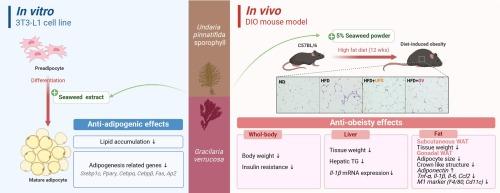Undaria pinnatifida Sporophyll and Gracilaria verrucosa Attenuate obesity-induced fat accumulation, adipose tissue macrophage infiltration, and systemic insulin resistance
IF 3.8
2区 农林科学
Q2 FOOD SCIENCE & TECHNOLOGY
引用次数: 0
Abstract
The potential health-promoting effects of two edible seaweeds, Undaria pinnatifida sporophyll (UPS) and Gracilaria verrucosa (GV), were investigated by using in vitro and in vivo models. Water extracts of UPS and GV inhibited lipid accumulation in 3T3-L1 adipocytes by downregulating adipogenesis-related genes and stimulated lipolysis in mature adipocytes. In C57BL/6 mice, supplementation with UPS and GV powders ameliorated diet-induced obesity, insulin resistance, and systemic inflammation, resulting in lighter subcutaneous adipose tissue and decreased macrophage markers (F4/80, Cd11c, Cd206) and proinflammatory genes (Tnf-α, Il-1β, Il-6, Ccl2) in gonadal adipose tissue. Liver weight and hepatic triglyceride levels were also significantly lowered. Taken together, UPS and GV supplementation effectively prevented diet-induced obesity and chronic inflammation making them promising dietary ingredients for managing obesity and its associated disorders.

Undaria pinnatifida Sporophyll 和 Gracilaria verrucosa 可减轻肥胖引起的脂肪堆积、脂肪组织巨噬细胞浸润和全身性胰岛素抵抗
研究人员利用体外和体内模型研究了两种可食用海藻--裙带菜孢子叶(UPS)和疣柄海藻(GV)的潜在健康促进作用。UPS 和 GV 的水提取物通过下调脂肪生成相关基因抑制了 3T3-L1 脂肪细胞的脂质积累,并刺激了成熟脂肪细胞的脂肪分解。在 C57BL/6 小鼠中,补充 UPS 和 GV 粉能改善饮食引起的肥胖、胰岛素抵抗和全身炎症,使皮下脂肪组织变轻,减少巨噬细胞标记物(F4/80、Cd11c、Cd206)和性腺脂肪组织中的促炎症基因(Tnf-α、Il-1β、Il-6、Ccl2)。肝脏重量和肝甘油三酯水平也明显降低。总之,补充 UPS 和 GV 能有效防止饮食引起的肥胖和慢性炎症,因此它们是治疗肥胖及其相关疾病的有前途的饮食成分。
本文章由计算机程序翻译,如有差异,请以英文原文为准。
求助全文
约1分钟内获得全文
求助全文
来源期刊

Journal of Functional Foods
FOOD SCIENCE & TECHNOLOGY-
CiteScore
9.60
自引率
1.80%
发文量
428
审稿时长
76 days
期刊介绍:
Journal of Functional Foods continues with the same aims and scope, editorial team, submission system and rigorous peer review. We give authors the possibility to publish their top-quality papers in a well-established leading journal in the food and nutrition fields. The Journal will keep its rigorous criteria to screen high impact research addressing relevant scientific topics and performed by sound methodologies.
The Journal of Functional Foods aims to bring together the results of fundamental and applied research into healthy foods and biologically active food ingredients.
The Journal is centered in the specific area at the boundaries among food technology, nutrition and health welcoming papers having a good interdisciplinary approach. The Journal will cover the fields of plant bioactives; dietary fibre, probiotics; functional lipids; bioactive peptides; vitamins, minerals and botanicals and other dietary supplements. Nutritional and technological aspects related to the development of functional foods and beverages are of core interest to the journal. Experimental works dealing with food digestion, bioavailability of food bioactives and on the mechanisms by which foods and their components are able to modulate physiological parameters connected with disease prevention are of particular interest as well as those dealing with personalized nutrition and nutritional needs in pathological subjects.
 求助内容:
求助内容: 应助结果提醒方式:
应助结果提醒方式:


